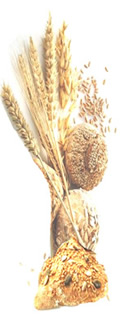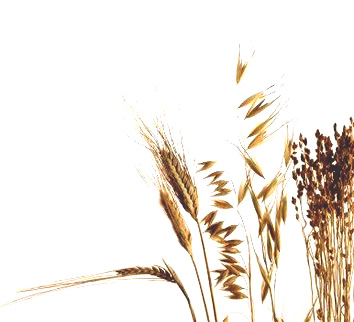|
FindingWhole Grains
|

xxBy CHRISTINE WOOD,M.D
xxxWWW.KIDEATGREAT.COM
xxLast year a new Food Guide Pyramid was released by the government
with a new website at www.MyPyramid.gov. One of the big changes in the
new Pyramid is that “Grains” replaced the old “Breads and Cereals” as a food
group. Any food made from wheat, rice, oats, cornmeal, barley or another
cereal grain is a grain product. There are two types of grain groups: “whole
grains” and “refined grains.” What they are also asking us to do is to try to
eat at least half of our grains as “whole grains.”
Why is it important to eat especially “whole” grains?
Whole grains are healthier and contain 3 parts of the grain:
the bran, germ,and endosperm. When the bran and germ  are removed, you
are removed, you
are left with a refined grain, but this process takes away
important nutrients like the fiber, iron, and many B
vitamins.
Eating grains, especially whole grains, provides health
benefits. People who eat whole grains as part of a healthy
diet have a reduced risk of some chronic diseases. Grains
provide many nutrients that are vital for the health and
maintenance of our bodies.
Ways to enjoy more whole grains
Many foods made from whole grains come ready to eat.These inlude
a variety of breads, pasta products and ready-to-eat cereals. Look for the
word "whole" on the package and in the ingredient list. Make sure whole
grains appear among the first items listed. Try to choose items with at least 3
grams of dietary fiber per serving.
Here are some suggestions:
• Look for bread that lists in the ingredients “whole wheat” or “100 percent
whole wheat.” If it says “wheat flour” or “wheat” this is not a whole grain
bread.
• Look for whole wheat tortillas, pasta, crackers (like Triscuits) and cereals.
• Oatmeal is an excellent way to get whole grains – try adding any
combination of raisins, dried apricots, papaya, mashed bananas, yogurt,
honey or cinnamon. Add oats to your homemade cookies and breads.
• Other more common whole grains: brown rice, (try air-popping for
healthier popcorn), wild rice, pearl barley. Try adding these to your soups,
casseroles and stews.
• Popcorn is a whole grain, but make it healthier by making air-popped
popcorn
• Most of us are less familiar with these grains, but they are available in
stores if you look: amaranth, quinoa, buckwheat, millet, spelt, triticale,
bulgur, whole grain cornmeal or whole rye. 
Eating more whole grains
can help to reduce your
risks of bowel
problems, cancer, heart
disease, high cholesterol,
high blood pressure,
obesity and type 2
diabetes.
So find those grains
and get your family used to eating them for health!
![]()
CONTAC
INFO: TEL.619-427-4111 EMAIL: health@infooption.com
|
Salud + Health Info is for information and educational purposes only. You should not rely on this information as a substitute for personal medical attention, diagnosis or hands-on treatment. If you are concerned abut your health or that of a child, please consult your family’s physician or health provider immediately and do not try to diagnose yourself.
Copyright © 2001-2006 Info Option Network
 info
info